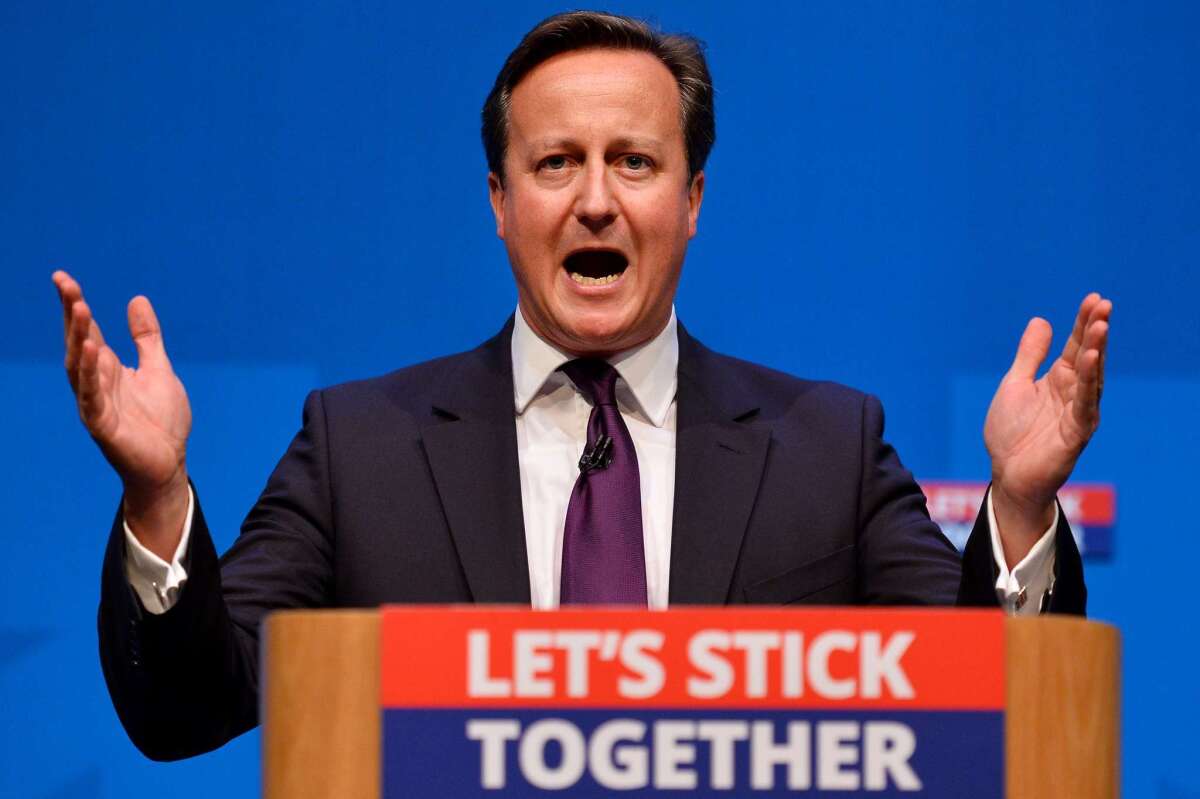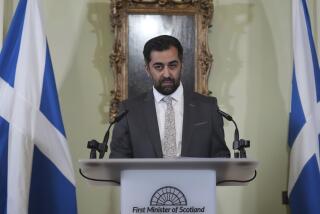British prime minister campaigns against Scottish independence

- Share via
Reporting from London — British Prime Minister David Cameron pushed hard against Scottish independence Monday, three days before Scots vote on whether to secede from Britain.
“I want to speak very directly to the people of this country today about what is at stake,” Cameron said in a speech in Aberdeen during his final visit to Scotland before the referendum Thursday. “There is no going back from this. No rerun. This is a once-and-for-all decision.”
Cameron and other pro-union political leaders have launched whirlwind campaign stops in Scotland as polls have narrowed in recent weeks, indicating that many people may vote for Scottish independence. A recent survey for Britain’s Sunday Times shows the pro-union camp 2 points ahead at 51%, and other polls suggest that the outcome is too close to call.
Scotland’s pro-union Better Together campaign has been criticized by supporters for focusing too much on the possible economic difficulties of independence, warning that an independent Scotland would no longer be able to use the British pound and that businesses would flee the uncertainty of a newly formed country.
Instead, Cameron’s strategy over these last few days is to appeal to voters’ emotions in his push to keep Britain together.
“I believe I speak for millions of people across England, Wales and Northern Ireland, and many in Scotland too, who would be utterly heartbroken by the breakup of our United Kingdom,” Cameron said. “It would be the end of a country that launched the Enlightenment, that abolished slavery, that drove the Industrial Revolution, that defeated fascism.”
Cameron also said he wanted to be clear with Scottish voters about the consequences.
“Independence would not be a trial separation. It would be a painful divorce, and as prime minister I have to tell you what that would mean,” he said, warning that a split could jeopardize pensions, mortgages, monetary stability and the state-run health system in Scotland.
“It would mean the borders we have would become international and may no longer be so easily crossed,” Cameron said. “It would mean the automatic support you get from British embassies when you’re traveling around the world ... would come to an end.”
Instead, he offered greater autonomy for Scotland within Britain if Scottish voters shun independence in Thursday’s vote.
Cameron was addressing an audience of his Conservative Party supporters. His handlers are keen to avoid hecklers on the pro-independence side. The debate has grown more intense as the vote draws near, and the prime minister is not popular in Scotland. Until recently, he has mostly stayed away from the campaign for fear his presence could stoke a backlash against the Tories.
“He’s tended to stay out of it because as he’s admitted he’s a posh boy from the south of England,” said Michael Keating, a political scientist at Scotland’s University of Aberdeen. “He was afraid to come up here, but then he did come up here and, you know, he didn’t get lynched. People listened to him. They took him seriously…. He may regret not having come here earlier.”
Keating was skeptical that Cameron’s appeal to Scottish heartstrings would work. “Cameron, like a lot of unionists, doesn’t really know which buttons to press to get the emotional response.”
Keating said the Conservatives hold only one of Scotland’s 59 seats in the British Parliament. The party has been in decline in Scotland since the 1980s, when the former Conservative prime minister, Margaret Thatcher, took on trade unions and closed coal mines in Scotland and other parts of Britain.
“There’s a constant misreading of Scotland, and the reason for that is the Conservatives lost their base in Scotland,” he said.
In their absence, Scotland’s First Minister Alex Salmond’s Scottish National Party has made independence its primary goal after it won a majority in the devolved Scottish Parliament in 2011.
Salmond has spent the final days of the campaign flying by helicopter from one Scottish town to another. He says the vote for independence is a once-in-a-lifetime chance for Scotland and he’s confident Scots will seize the opportunity.
In a statement on Cameron’s visit, Salmond said: “The next time he comes to Scotland it will not be to love-bomb or engage in desperate last-minute scaremongering.… Following a ‘yes’ vote, it will be to engage in serious post-referendum talks” on how to divide Britain.
Werth is a special correspondent.
More to Read
Sign up for Essential California
The most important California stories and recommendations in your inbox every morning.
You may occasionally receive promotional content from the Los Angeles Times.










